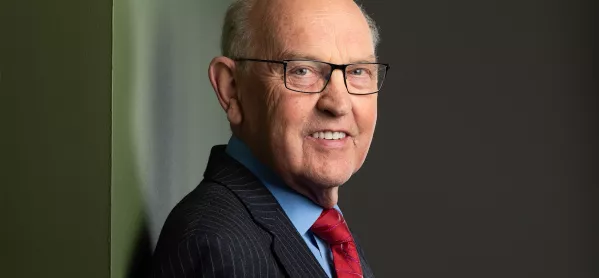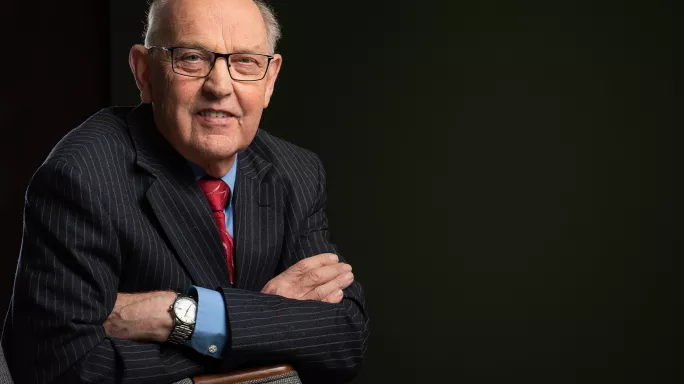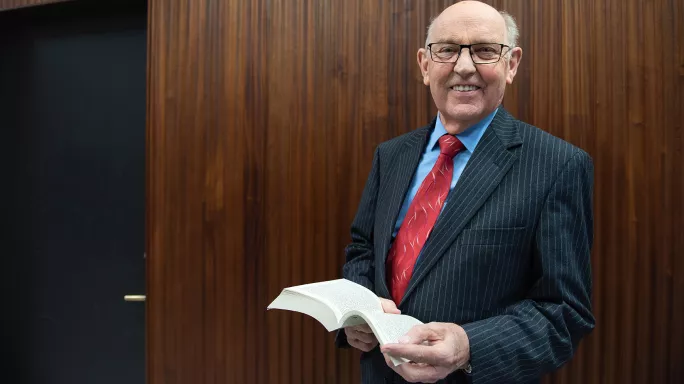- Home
- Is this the most influential man in UK schools?
Is this the most influential man in UK schools?

The PiXL Club is one of the most quietly influential organisations in the British schools system.
Founded by former headteacher Sir John Rowling in 2005 as a network comprising just 55 schools, it now has a membership of nearly 3,000 schools in the UK, as well as about 250 internationally.
But with influence comes controversy. The source of that controversy is hinted at by a testimonial quote on the wall of PiXL’s London office: “Whooooo Hooo! 47%... from 31% last year. Thanks so much for your support.”
Lauded by some schools for transforming their exam results, PiXL has also been accused of teaching schools how to game the system.
So which is the real PiXL? Tes met Rowling to find out.

Most of the building seems to be occupied by start-ups. Trendy millennials slink along the corridors, and even the lifts are ironic; when you ascend to PiXL’s floor, the words #ThisIsAwkward are written on the inside of the doors.
What you are not necessarily expecting, in this uber-hip milieu, is to be greeted by a sprightly pin-striped Yorkshireman in his seventies. “Hellooooo,” says Rowling, extending the final syllable.
From Doncaster to the London Challenge
Speaking in a sonorous voice, Rowling recounts the story of how he entered the teaching profession and founded PiXL. He’s in a constant state of animation as he talks; one moment he has a leg crooked over his armrest, the next he’s leaning so far forward his head is almost touching the table.
Born in Doncaster in 1941, he came from a “very normal, not very wealthy home with caring parents”. He went to the local grammar school, and then became the first in his family to go to university.
It was while studying a Master’s degree that one of his professors told him about a maths post that had become available at the Royal Grammar School Newcastle. Rowling says he visited the school and was “bowled over” by what he saw. He took the job straight away and stayed at the school for 11 years.
Although he’s only ever been employed by three schools, Rowling seems to have experienced the whole gamut of the education system. RGS Newcastle is an independent school, and Rowling says it was “fantastically privileged” and full of “very bright people” when he taught there. His next job took him to Hirst High School in Ashington - a poor mining community “deep in Northumberland”. The school was a secondary modern in the process of becoming a comprehensive - “just about the opposite extreme” to his previous school. There were “a lot of serious issues, social and otherwise,” Rowling recalls. He stayed there for 11 years, too.
It was at Rowling’s third and final school, Nunthorpe School in Middlesbrough, where he attained headship. Nunthorpe was “sort of halfway between” his previous two schools in terms of the affluence of the intake. Under his leadership, it became high achieving, and Rowling began to attract notice. The Department for Education visited the school, and it was off the back of that visit that Rowling was offered an opportunity to work with Sir Tim Brighouse on the London Challenge - the school improvement programme launched in 2003 to turnaround poor standards in the capital. Around the same time, Rowling’s contribution to education was recognised with a knighthood.
In the London Challenge, Rowling was originally given 22 schools to work with. Nineteen of those were underperforming, and he managed to raise standards in all of them. “The DfE said ‘will you do some more?’ So next year they gave me 35. Same [improvement] happened again. A third year they asked me if I could do some more, and we had 55.”
Initially, each school was given £9,000 to spend on improvement activities. However, in the third year, the DfE decided to withdraw the funding and wanted to redeploy Rowling onto another project within the London Challenge. But Rowling wasn’t going to play ball. “I was in a quandary then because I’d built relationships with these schools,” he says. “I said no to the department, I won’t go because you’ve set me up with these schools, and I love them, frankly.”
Rowling still had to break the bad news about the funding being pulled. He gathered the 55 schools together and told them. Their response took him totally by surprise; the schools voted unanimously that they wanted to continue working together, paying for the support themselves if necessary. So Rowling found himself practically press-ganged into setting up PiXL. “I had no intention of doing it, really,” he muses. “Didn’t go out to set something up, but that’s how it happened.”
‘If we don’t scratch where people itch, we die.’
PiXL (which stands for Partners in Excellence) has mushroomed since then - its UK membership now includes 1,600 secondaries, 800 primaries, 520 sixth forms and about 60 providers of alternative education. The network exists to share resources, exchange ideas and provide advice. “This thing’s just grown because people wanted it and because they thought it was helping, and because it was scratching where they itch,” says Rowling. “If we don’t scratch where people itch, we die.”
Rowling characterises PiXL’s priorities as “the three Cs”: currency, character and community. It’s the first one - currency - that has resulted in a fourth C: controversy.

If Rowling was animated already, he cranks up to another gear when defending the work PiXL does to boost schools’ exam results. He periodically strikes the table with his hand to emphasise a point. “Currency - helping young people get the best results they’re capable of - that must never, ever be sacrificed for me,” he intones. Exam outcomes, he says, are critical because they are “what kids have in their hands to take into the world to trade with”.
Rowling says “the controversial bit” is when a student is on the margins between two grades. “What happens is the coaching business in those areas flourishes.” He argues this long predates the arrival of PiXL, and is particularly rife in elite schools where students are taught how to jump through all the right hoops to get top grades. But he believes some people who engage in this practice with privileged pupils hypocritically “take exception to the fact that we try to do that with weak kids”.
“We’re tutoring to get a kid a grade 4, so they go on to sixth-form college - it’s a big deal for them,” he says. “It’s not cheating, it’s not immoral,” he insists. “If you’ve got a kid learning to drive that can’t do three-point-turns, any sensible driver goes out on the road for an extra five hours until he can do three-point-turns, so he can pass his driving test and move on. And that’s what we do.”
It’s funny that Rowling should mention driving tests. The biggest controversy to engulf PiXL was its recommendation that schools should teach the European Computer Driving Licence - an IT qualification that was at one point recognised in the government’s performance tables as equivalent to a two-year GCSE, but that critics claimed could be taught in as little as three days.
Reports emerged that PiXL was urging schools to enter their entire cohort for the ECDL as a way of boosting Progress 8 scores. While PiXL denied it was trying to game the system, the government ended up withdrawing its recognition of the ECDL following the furore.
The episode was a perfect crystallisation of the criticism of PiXL - the claim that it doesn’t just teach pupils how to tick the right boxes in their exams, but actively encourages schools to do things that aren’t in the best interests of students in order to stay on the right side of the accountability system. The same accusation was levelled at PiXL in 2012 when it emerged it was encouraging double-entry of pupils for both the English GCSE and international GCSE as a way of improving grades.
Needless to say, Rowling rejects this claim. “I’m not advocating bringing something out of nothing on the back of lousy teaching, and ‘let’s give you a Mickey Mouse course that will get you a grade.’”
What PiXL does, he argues, is help vulnerable pupils achieve “some success” by getting them qualifications they can use. Rowling seems to suggest that some of PiXL’s critics would rather see these pupils leave school with nothing. “Have you ever understood what it’s like to go to school for five years and never, ever achieve anything?” he says, bristling with indignation. “I had people coming to my school for five years, going out with five Es and two Fs. Because I cared about them, I would go up to them and put my arm around them - as you could in those days - and say, ‘Well done, son, good for you.’ And then I went away one day and said, ‘This is absolutely ridiculous.’”
The highest profile criticism of PiXL in recent months has come from Amanda Spielman, the chief inspector of Ofsted. In a speech earlier this year, she said that Ofsted’s new inspection framework - which aims to shift focus away from exam results and towards the curriculum - would combat the “Pixlification of education”.
How did Rowling feel upon hearing that remark? “We were staggered that people thought we were having so much influence,” he replies breezily. Rowling says he had an “excellent” meeting with Spielman after she made her comments. Asked whether PiXL is prepping its members on how to navigate the new inspection framework, he says no. “We don’t want to react too quickly because we’re not entirely sure how this will look.”
The new framework could represent a threat to PiXL, but it’s not the only risk it faces. Funding pressures are forcing schools to look at every cost - including membership fees. Rowling admits this could pose an issue, but points out that PiXL has grown its membership every year. “We never take it for granted and we always wonder year on year what’s going to happen. It’s a funny way to run a business really,” he admits. “Keeps your heart in your mouth. It also keeps you on edge, because if you’re not delivering what people want, they won’t come back, will they?”
PiXL’s best years might just still lie ahead of it. The three great crises affecting schools - funding, recruitment and workload - could put a premium on collaboration. Just as multi-academy trusts have promised to cut workload via centralised lesson planning, Rowling says PiXL is able to draw on expertise across its network to create classroom resources which individual schools wouldn’t have the time or know-how to produce themselves.
‘I have never breached the system’
The schools system isn’t short of people who rail against a target-oriented, test-driven culture. Rowling is no fan of high stakes accountability either. But while organisations like the teaching unions want to overhaul that system, Rowling is more of a pragmatist. There will always be end tests, he says, and there will always be inspection which will always include a “sharp end”. He may have his reservations about the system, but Rowling’s focus is on working within the system to get the most out of it.
He returns repeatedly to the fact that he “didn’t invent” the system, and has always abided by its rules. “I have never breached the system that is imposed upon us, whatever colour government, whatever statement from Ofsted. Never, ever,” he says doggedly. “We did ECDL when ECDL was ratified by the qualifications authority. We did coursework when coursework was accepted as part of standard practice.”
So is PiXL the champion of schools, or an organisation that shamelessly exploits the rules? The jury is still out. What isn’t in doubt, is that Sir John Rowling believes with utter conviction that he is doing the right thing by his schools and pupils.
As he reflects on the past 50 years, tears spring to the corners of his eyes. “We made some mistakes along the line, but I don’t know if I can believe what’s happened,” he says quietly.
“I really don’t know if I can believe what’s happened.
“I was a normal headteacher in a normal school, in Middlesbrough, of all places, coming to the big city where everything happened. And it all happened by chance, really.”
CV: Sir John Rowling
Adwick Junior School, Doncaster
Percy Jackson Grammar School, latterly Adwick School
1959-1962: BSc Mathematics, Durham University
1962-1963: Applied Mathematics, Durham University
1963-1973: Teacher and Sixth Form leader, The Royal Grammar School, Newcastle on Tyne
1973-1984: Teacher and Deputy Head, Hirst High School Ashington
1984-2003: Headteacher, Nunthorpe School, Middlesbrough
2003-2006: London Challenge Team working on raising standards
2006-2018: Founding Leader of PiXL, Partners in Excellence
Keep reading for just £1 per month
You've reached your limit of free articles this month. Subscribe for £1 per month for three months and get:
- Unlimited access to all Tes magazine content
- Exclusive subscriber-only stories
- Award-winning email newsletters



